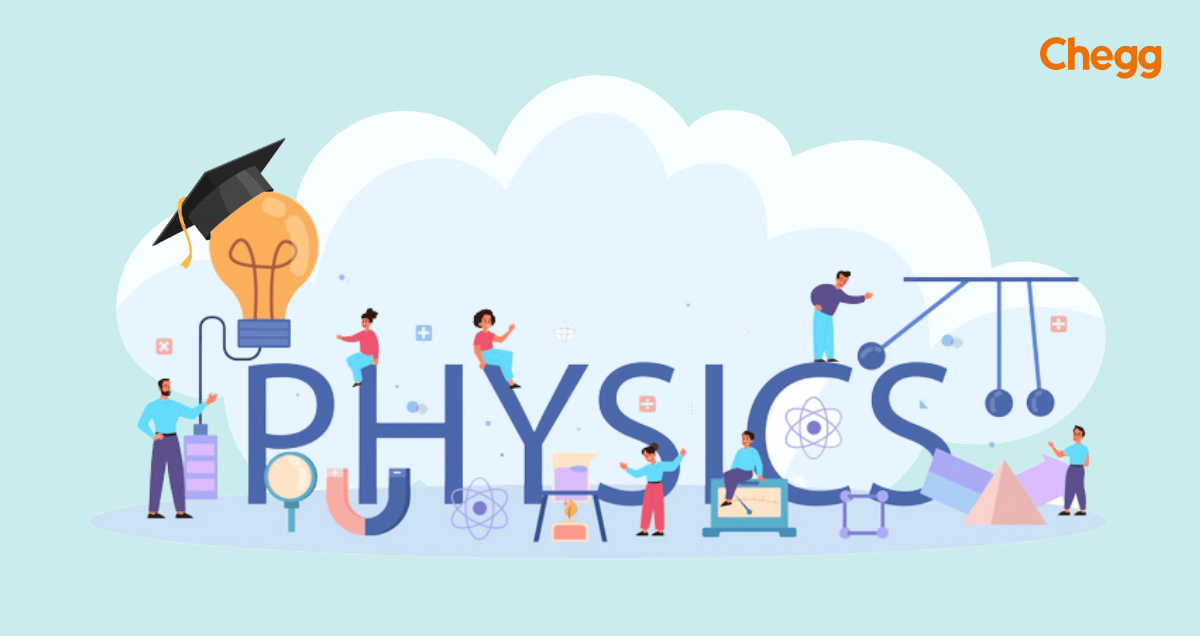BSc Physics-Course Details and Scope in India
BSc Physics is an undergraduate-level course offered for a duration of three years divided into six semesters. The course deals with the theories and application of physics in our surroundings and space. B.Sc physics courses can be pursued by students who have completed their Class 12 education from the science stream.

BSc Physics is an undergraduate-level course offered for a duration of three years divided into six semesters. The course deals with the theories and application of physics in our surroundings and space. B.Sc physics courses can be pursued by students who have completed their Class 12 education from the science stream. A student with a science stream and majoring in Biology is also eligible to apply for a B.Sc in Physics course.
Several top universities are offering courses in B.Sc Physics. This allows students to build a great future. After completing the bachelor’s degree in physics students can pursue any professional career of their choice. Physics BSc opens the doors for multiple opportunities. These are discussed later on in this article. Before that, let’s understand more about BSc Physics course.
BSc Physics Highlights
The Bachelor of Physics course is a good course for students who have a keen interest in Physics. Students who want to make a career in the Physics BSc field should know the details of this course. Here are some quick details about the course which students can refer to.
B.Sc Physics Key Points-
| Particular | Details |
| Course Name | Bachelor of Science in Physics |
| Duration | Three-years |
| Eligibility Criteria | Class 12 with Physics, Chemistry, Maths/Biology |
| Entrance Exam | CUET, JEE Main, BHU-UET |
| BSc Physics Fees | Rs 11,000 to Rs 4,00,000 per year. |
| Admission Process | Merit and Entrance Based |
| Average Salary Range | Rs 6,00,000 per annum |
| Job Roles | Lab assistant, technician, subject matter expert, etc |
Skills Needed for BSc Physics
A bachelor in Physics offers great learning opportunities to students. Students who possess relevant skills can easily complete this course. Following are some of the skills that can help students clear BSc in Physics.
- Technical Skills – Students will deal with various technical concepts while pursuing BSc in Physics. Good technical skills can help them grasp such concepts easily.
- Attention to Detail Skills – The course is vast and involves various concepts that interplay with each other. Attention to detail can help students learn deep insights into various subjects.
- Problem-Solving Skills – Physics develops students to solve various problems. This is one of the key skills to making new scientific discoveries. Good problem-solving skills can help students not only during the course but throughout their careers.
- Communication Skills – Communication is important in any sphere of life. Students having good communication skills can communicate better with peers and mentors. This will enhance their overall learning experience.
- Teamwork Skills – Students will work on various projects. Teamwork is one of the most important skills in this career.
BSc Physics Syllabus and Subject
The BSc Physics subjects list is divided into semesters. The BSc Physics subjects include the following:
- core subjects,
- general elective courses,
- skill enhancement courses , and
- discipline-specific elective courses.
The B.Sc Physics is offered under a credit-based system. Each BSc Physics subject has a specified number of credits. The students can get these credits once they complete the classes and pass the exam for the subject. Here is the BSc Physics subject list for each semester.
BSc Physics Core Subjects-
Semesters |
Course Name (Theory and Lab) |
| 1 | Mathematical Physics – I, Mechanics |
| 2 | Electricity and Magnetism, Waves and Optics |
| 3 | Mathematical Physics – II, Thermal Physics, Digital Systems and Applications |
| 4 | Mathematical Physics – III, Elements of Modern Physics, Analog Systems and Applications |
| 5 | Quantum Mechanics and Application, Solid State Physics |
| 6 | Electromagnetic Theory, Statistical Mechanics |
BSc Physics Subjects (Discipline-Specific Elective Courses)-
Semesters |
Course Name |
| 5 | Advanced Mathematical Physics and Lab, Experimental Techniques and Lab, Nuclear and Particle Physics, Physics of Devices and Communication and Lab, Astronomy and Astrophysics, Atmospheric Physics and Lab, Biological Physics, Embedded Systems– Introduction of Microcontroller and Lab, Linear Algebra and Tensor Analysis. |
| 6 | Nano Materials and Application and Lab, Communication System and Lab, Medical Physics and Lab, Applied Dynamics and Lab, Digital Signal Processing and Lab, Physics of the Earth, Advanced Mathematical Physics II, Classical Dynamics, Dissertation, Verilog and FPGA-Based System Design and Lab, |
BSc Physics Subjects (Skill Enhancement Courses)-
| Semesters | Course Name (Theory and Lab) |
| 1 | Electricity and Magnetism, Mathematical Physics – I, Digital, Analog and Instrumentation, Applied Dynamics, Medical Physics. |
| 2 | Mechanics, Elements of Modern Physics, Solid State Physics, Embedded Systems – Introduction of Microcontroller, Biological Physics. |
| 3 | Waves and Optics, Quantum Mechanics, Communication System, Verilog and FPGA-Based System Design, Nano Materials and Applications. |
| 4. | Thermal Physics and Statistical Mechanics, Digital Signal processing, Nuclear and Particle Physics, Astronomy and Astrophysics, Atmospheric Physics, Physics of the Earth. |
BSc Physics Subjects (Skill Enhancement Courses)-
| Semesters | Course Name |
| 3 & 4 | Physics Workshop Skills, Computational Physics Skills, Electrical Circuit and Network Skills, Basic Instrumentation Skills, Renewable Energy and Energy Harvesting, Engineering design and prototyping/Technical Drawing, Radiation Safety, Applied Optics, Weather Forecasting, Introduction to Physical Computing, Numerical Analysis. |
Difference between BSc Physics and BSc Advanced Physics
BSc in Physics and BSc in Advance Physics deals with the same science stream. But there are differences in the subjects being taught. Students need to understand the difference between both these courses.
Bachelor in Physics covers undergraduate-level education in physics. This course will provide you with professional-level knowledge of all the branches of physics. Meanwhile, BSc advanced physics covers the subjects coming under it and the curriculum is in-depth for the same.
Both courses are undergraduate courses and are offered for three years. Admissions to both courses require a student to qualify for the same entrance exams. But, the cutoff for each course may differ. BSc Advance Physics and BSc Physics eligibility may also differ for admissions.
Difference Between BSc Physics and BSc Advanced Physics-
| BSc Physics. | BSc Advanced Physics. |
| Aims to offer students a broad spectrum of knowledge of physics. | Aims to give in-depth knowledge of advanced physics subjects. It includes technical and theoretical training. |
Top Colleges for BSc Physics
Several top universities/colleges offer B.S Physics courses. The admissions to these colleges depend upon students qualifying the eligibility criteria of that particular college. Apart from eligibility criteria, students must also qualify for the entrance exam. Top colleges also consider Class 12th marks for admissions. Below are some of the top colleges that are offering B.S physics courses in India.
Find below the list of top 5 colleges for B Sc Physics in India with fee details-
| College Name. | Location. | Fee. |
| St. Stephen’s College, New Delhi. | New Delhi | Rs 42,835 per semester. |
| Hindu College, New Delhi. | New Delhi | Rs 20,460 per year. |
| Fergusson College, Pune. | Pune | Rs 11,135 per year. |
| St. Xavier’s College, Kolkata. | Kolkata | Rs 20,166 per year. |
| Stella Maris College, Chennai. | Chennai | Rs 22,895 per year. |
Jobs after BSc Physics in India
There are several jobs that a student can pursue after completing his or her course in BSc in Physics. Following are some of the job roles that can be taken up after BSc Physics course completion. The table below also discusses the job details and average salary.
Jobs After Completing B.Sc Physics in India-
| Career | Job Details | Salary Range |
| Physicist | – Physicists work with cutting-edge human sciences. They work on theoretical or hypothetical concepts of physics backed with scientific methods. – They use current techniques and technology to solve massive puzzles.· This includes using general scientific concepts in an organized manner. – Physicists also capture data and compile it into a summary. They derive meaningful conclusions from these data. |
Rs 7,00,000 to Rs 12,00,000 per annum. |
| Physics Lecturer | – Professors assist students in learning concepts of energy, matter, force, material, and related laws. – They are enthusiastic about physical science. They participate in shaping the careers of students. – They are skilled in creating intriguing teaching materials. |
Rs 7,20,000 to Rs 18,00,000 per annum based on years of experience. |
| Lab Assistant | – The lab assistants plan, conduct, and document measurement systems and test experimentation series. – They investigate the structure, constitution, characteristics, and quality of various technologies and materials. – They assist their seniors in conducting experiments. |
Rs 2,50,000 to Rs 7,00,000 per annum based on years of experience. |
| Research Associate | – These scientists employ numerical methods and computer tools to address physics issues. – These include large-scale climate simulations, semiconductor property studies, and protein folding calculations. – They participate in various research and develop new scientific methods and theories. |
Rs 3,80,000 to Rs 7,00,000 per annum based on years of experience. |
| Subject Matter Expert | – A Subject Matter Expert (SME) has specialized knowledge, in-depth understanding, and competence in a certain subject. – The fundamental content creation task consists of thoroughly explained responses to unsolvable end-chapter activities in different forms and panels. – SME responsibilities include assessing material prepared by others such as students, research analysts, etc. – They also advise others on how to provide high-quality solutions and guidance. – Becoming a Chegg Q&A expert is a great opportunity after completing the BSc Physics course. To become a Chegg Q&A expert a candidate must have deep subject knowledge as a subject matter expert. This will assist them to solve the subject problems easily and provide solutions. |
Rs 4,40,000 to Rs 8,80,000 per annum based on years of experience. |
| Technician | – A technician is responsible for the maintenance of some or all of the equipment in the lab. – They solve any technical fault that may arise in scientific devices. |
Rs 2,60,000 to Rs 6,00,000 per year. |
| Academic Counsellor | – Academic counselors assist students in selecting programs. – They ensure that selected courses comply with the suggested curriculum for the student’s major to satisfy degree requirements. – Academic counselors recommend educational alternatives that complement a student’s planned career ambitions. |
Rs 3,50,000 to Rs 6,00,000 per year based on years of experience. |
| Content Developer | – A content developer generates digital and printed material for a business’s target audience. – This includes blog entries, publications, videos, audiobooks, social media posts, research papers, electronic books, and illustrations. – These materials aid in the learning and development of content. |
Rs 3,50,000 to Rs 10,00,000 per year based on years of experience. |
| Quality Control Manager | – Quality control managers control product innovation operations.· They oversee employees to ensure that goods fulfill high-quality and efficiency criteria. – They work closely with third parties and external clients. – They verify that finished goods match their demands and specifications. |
Rs 4,50,000 to Rs 30,00,000 per year based on years of experience. |
| Scientist | – Scientists can undertake basic research in higher education institutions or government facilities. – They may employ applied science methods in an industrial or manufacturing context. – Experimental physicists often operate in laboratories, testing hypotheses and theories. – They also discover new occurrences and develop innovative solutions to concepts. |
Rs 6,00,000 to Rs 18,00,000 per year based on years of experience. |
| Radiation Oncologist | – A radiation oncologist receives specialized training in delivering radiation therapy to patients with advanced cancer. – This includes patients with specific noncancerous (benign) diseases. – Specialists focus on treating all forms of diseases. This can include complicated and uncommon tumors. |
Rs 24,00,000 to Rs 40,00,000 per year based on years of experience. |
Frequently Asked Questions
BSc Physics subjects include various subjects that surround physics. Some of these subjects include the following:
– Mathematical Physics
– Electricity and Magnetism
– Waves and Optics
– Thermal Physics
– Digital Systems and Applications
– Elements of Modern Physics
– Analog Systems and Applications
– Solid State Physics
– Statistics among other subjects
B Sc Physics is a three-year undergraduate course in physics. The course is offered in several top colleges. It follows a credit-based system.
BSc Physics is an excellent degree to pursue. It offers several career prospects to students who have completed their courses. Students who are science enthusiasts and have an interest in physics can pursue this course.
Students can pursue careers as a physicist, Physics Lecturer, Lab Assistant, Research Associate, Subject Matter Expert, Technician, Radiologist Assistant, Q&A expert at Chegg, and Academic Counsellor among other roles after completing bachelor degree in physics.
The post BSc Physics-Course Details and Scope in India appeared first on Chegg India.


















/cdn.vox-cdn.com/uploads/chorus_asset/file/25115065/DCD_Avishai_Abrahami.jpg)







